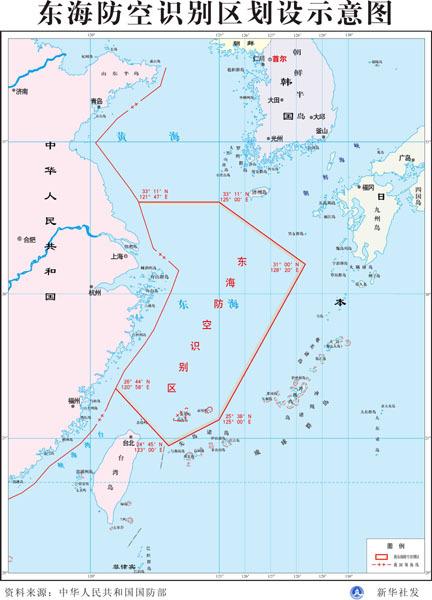

East China Sea Air Defense Identification Zone (Source: xinhuanet.com)
After holding talks with Japanese Prime Minister Shinzo Abe,US Vice President Joseph Biden said in Tokyo, the first leg of his week-long trip to East Asia, Tuesday that China and Japan should set up a bilateral "crisis management mechanism" to prevent current tensions from escalating further. [Special coverage]
Biden said Washington's priority lied at easing tensions in the region. He fell short of publicly calling for China's immediate withdrawal of its air defense identification zone (ADIZ), which Japan had hoped the visitingUS official could mention during the joint press conference.
Discrepancy between Tokyo and Washington was spotted in their responses to the newly-declared ADIZ over the East China Sea.
Japan told its airlines to defy the Chinese demand of notifying flight plants when aircraft, military or commercial, pass through the said airspace. In contrast, theUS aviation authorities instructed commercial airliners to file flight plans with the Chinese authorities.
In South Korea, at an early stage of the controversy, the foreign ministry expressed its official regrets over China's ADIZ, but signs were detected in the presidential office Cheong Wa Dae that Seoul may seek to take cautious stance on the ADIZ issue.
According to local media reports, President Park instructed officials to review various options, including expanding its own air defense zone (KADIZ), and her chief security advisor Kim Jang- soo convened an emergency meeting pertaining to the matter on Sunday.
Senior presidential press secretary Lee Jung-hyun told reporters that basic guidelines were discussed during the security meeting, but local reports said that a tentative conclusion was reached on how to enlarge the 60-year-old KADIZ southward.
To finalize its position on the KADIZ expansion, the Seoul government officials were originally scheduled to hold a consultation meeting on Tuesday with the ruling Saenuri Party lawmakers, but the meeting was abruptly delayed amid speculation that Seoul may have sought to monitor Biden's trip to Japan and China before deciding on it.
After holding talks in Beijing with Chinese President Xi Jinping, Biden was slated to arrive in Seoul late Thursday to complete his week-long East Asian tour and meet with President Park, with whom Biden would exchange views over China's ADIZ issue.
Given the so-called "balanced diplomacy" preached by President Park, South Korea was not expected to go so far as to expand its air defense zone without consultations with its neighboring countries, or at least advance notice, as the expansion may cause backlashes from China as well as the United Statesthat were seeking to prevent tensions in the region from escalating further.
As the White Housesaid in a statement, Biden's trip to Japan, China and South Korea was intended to reassure its strong commitment to "rebalancingUS foreign policy towards the Asia- Pacific," not delivering its official protest to Beijing.
Chinese Foreign Ministry spokesman Qin Gang said last Friday that the newly-established ADIZ will not cause regional tension.
"China's ADIZ over the East China Sea is not aimed at any specific country nor target. It's absolutely a measure designated to exercise the right of defense effectively," Qin told a regular press briefing, adding that if some worry has emerged about the situation, it's agitated by some individual countries.
The United States has supported Japan's pursuit of collective self-defense right, which caused strong backlashes from China and South Korea as it was reminiscent of Japan's militaristic past, but Washington seemed to have no intention to damage its bilateral ties with Beijing, betting both on Beijing and Tokyo to maintain its presence in the region.
Seoul and Tokyo have been at odds over historical perception. South Korean Foreign Minister Yun Byung-se said in late November that ties between the two countries strained due mainly to Japanese leaderships' unrepentant attitude toward its militaristic past, noting that one who tied a knot should untie it.
South Korean President Park Geun-hye has harshly denounced the Japanese leadership for no repentance over its atrocities under the colonial rule from 1910 to 1945, refusing to hold summit talks until now with Abe since her inauguration in February this year.
China urges US to respect ADIZ
2013-12-05China, US in touch on ADIZ: FM spokesman
2013-12-05China‘s ADIZ to improve identification: FM spokesman
2013-12-04China‘s ADIZ will not cause tension: spokesman
2013-11-30Air force patrols of China‘s ADIZ legitimate: spokesman
2013-11-30Copyright ©1999-2018
Chinanews.com. All rights reserved.
Reproduction in whole or in part without permission is prohibited.